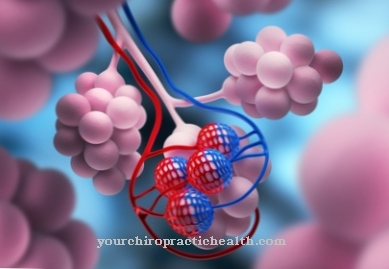Gross motor skills is, just like fine motor skills, a movement function of the human body. Gross motor movements are accompanied by movement of the whole body, e.g. when jumping or running.
What is gross motor skills?
While fine motor skills involve careful movement of individual parts of the body, gross motor movement is characterized by a large movement amplitude. This means that all of the work of the skeletal muscles is counted as gross motor skills.
Function & task

Motor skills play a particularly important role in child development. Gross motor skills - such as crawling - prepare the developmental sequence for fine motor skills, which in preschool age is shown, for example, in correctly holding a pen. If a child has not acquired sufficient gross motor skills, the acquisition of fine motor skills is impossible, or at least very problematic.
Children should therefore be able to gain sufficient gross motor experience. Otherwise, if they have insufficient gross motor skills, e.g. Difficult to learn to write or to develop manual skills, which is expressed in a reluctance to be creative and, by and large, makes them less fit for life.
Gross motor skills can be trained through sport, for example. In babies, however, the onset of gross motor skills cannot be influenced by external factors. Nonetheless, developmental disorders in babies and toddlers also show up when gross motor skills are not developed in accordance with their age.
There are different tests to check the level of development of a child and thus determine whether a motor development disorder is present. To determine the level of gross motor skills in a patient, one examines his muscle tension, his sense of balance and his feeling for his own body (body feeling). For this purpose, the doctor can, for example, ask the patient to stand on one leg. If this is difficult for him, this is often a sign of a gross motor deficit, which can occur not only due to a developmental disorder, but also due to other diseases or a generally poor constitution.
Since there are many reasons for a gross motor disorder, the specialists involved in the diagnosis come from different disciplines: primarily from neurology, but also from internal medicine. For the purpose of a differentiated diagnosis, imaging methods are also used if necessary. An MRI can e.g. Examine the spine or brain for damage and injury to determine whether this is the cause of a sudden gross motor deficit.
If an organic cause has been ruled out by the specialists' diagnosis, the patient can undergo physiotherapy. In children in particular, this is necessary so that the development deficit in gross motor skills can be eliminated. Because in addition to e.g. School problems that poorly developed gross motor skills can lead to, also affects the child's self-esteem. If the fear of being embarrassed increases, this in turn has a negative impact on gross motor skills: If children no longer dare to try out unfamiliar movements, their development stagnates.
You can find your medication here
➔ Medicines against concentration disordersIllnesses & ailments
Various diseases impede gross motor skills or the development of gross motor skills. A symptom of ADHD (also known as ADD) can represent a development deficit in the area of gross motor skills. A stroke can also affect gross motor skills. In Alzheimer's disease, the body loses memory for motor skills it once acquired, which is why this disease can also have an impact on gross motor skills.
Gross motor skills are also impaired from the use of alcohol and drugs; however, when the toxic substances are eliminated, it is restored. The situation is different with severe injuries to the spinal cord: If the impulses for gross and fine motor movements do not reach the extremities via the nerve tracts, the patient must be treated immediately in intensive care. If a fall occurs, the paramedics first check the gross motor skills of the individual extremities, provided the injured person is conscious, in order to rule out a serious injury to the spinal cord.
If there is a tumor in the brain or spinal cord, it may also affect gross motor skills. Namely when the position of the tumor prevents the transmission of impulses for movement. Sudden disturbances in gross motor skills can also indicate damage to the brain or spinal cord. They are a warning signal from the body and require further medical checks.
Joint and muscle problems can also lead to gross motor impairment. Physiotherapy measures can be helpful in eliminating such movement problems. Under no circumstances should this measure be carried out on your own initiative, as this can exacerbate the underlying problem.
If the gross motor skills prevent a patient from exercising sporting activities and from flowing movement, it is advisable to see a doctor. This is especially true in children, whose motor development must be observed with special attention.





.jpg)







.jpg)

.jpg)
.jpg)











.jpg)